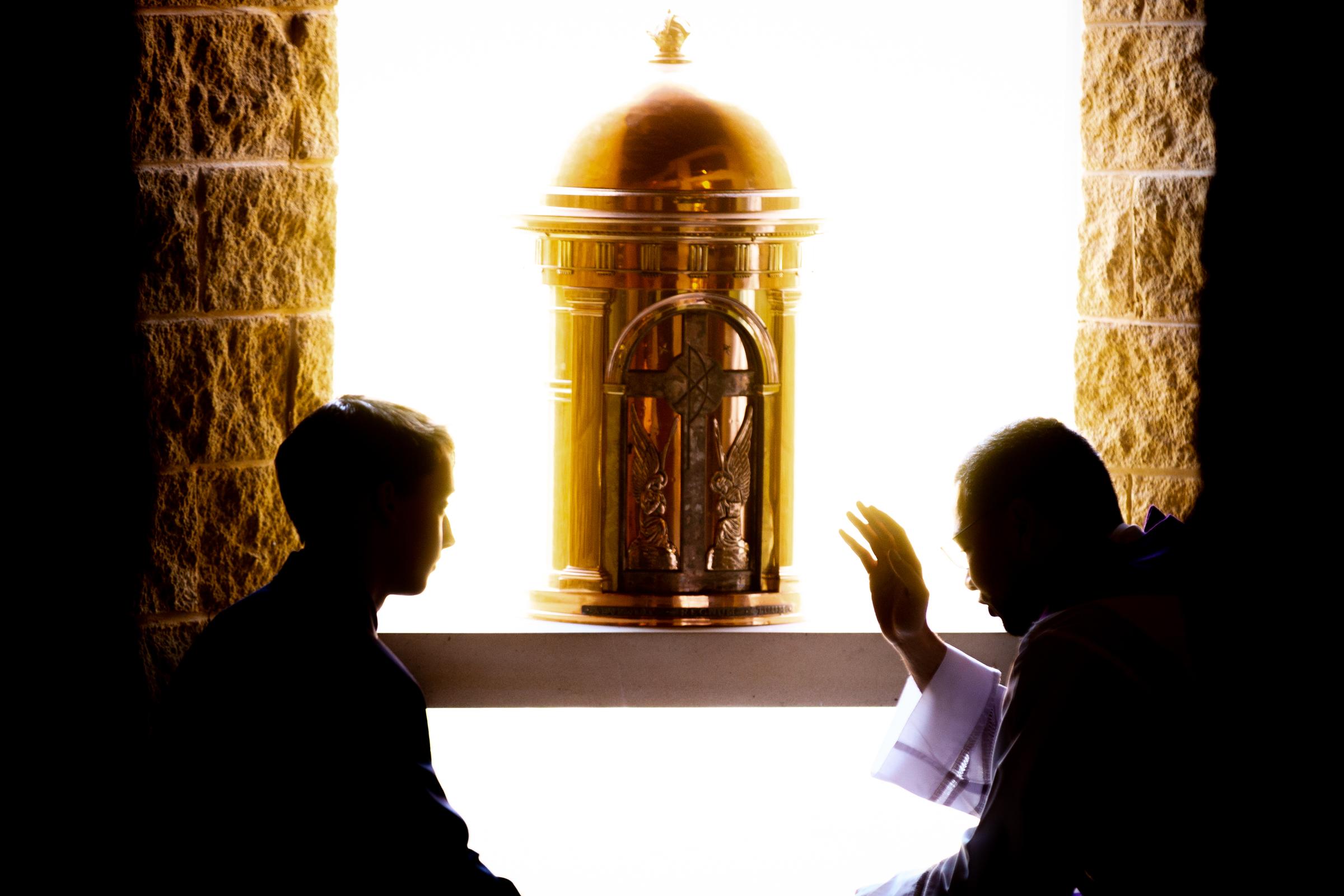Liturgy

Community Mass
Students in Year 9 will be preparing Community Mass next Friday. As Spring mornings get warmer and brighter, families are encouraged to gather for our joyous and user-friendly liturgies.
For those able to stay a bit longer, there is coffee and conversation in the Circle of Friends Café after Mass.
Community Mass details
- College Chapel
- Fridays in term time
- Starts: 8:00am and concludes 8:30am
SACRAMENT PROGRAM
‘Family-focused, parish-based, Catholic school supported’
Enrolment details for parishes of City Beach, Doubleview, Subiaco and Cottesloe/Mosman Park, may be found here.
Cottesloe/Mosman Park Parish advises that the Sacrament of Confirmation will be celebrated Sunday 6 November.
Doubleview Parish advises that First Holy Communion will be celebrated on Saturday 17 September and Reconciliation will be celebrated in the last week of October.
If you would like further information contact:
- If your nearest parish is not listed, search the Archdiocesan website;
- Contact Mary-Anne Lumley mary-anne.lumley@cewa.edu.au 08 9383 0513.
Good News for the 24th Sunday in Ordinary Time
The reflection by Mary Coloe for this Sunday’s Gospel offers both a refreshing and challenging reading of the much-loved parable known as ‘The Prodigal Son’ or ‘The Forgiving Father’.[1]
Sunday’s Gospel sets up contrasting attitudes to Jesus. The rejects of society, the tax collectors and sinners are seeking his company; the religious people, characterised here by the scribes and Pharisees, are scandalised by Jesus’ acceptance of these social outcasts. This situation leads into Jesus speaking a parable, the well-known story of the ‘Prodigal Son’. Luke has introduced this parable with two shorter stories of people who lose and find things, but these introductory stories are misplaced and can distract from the particular parable told by Jesus in this situation.
Too often we hear this as the story of the younger son seeking forgiveness and receiving it, but the point of the story is not the younger son – if this was the case we would only need a one-son parable. The focus on the story lies with the second son. Let’s begin reading the parable carefully –
The younger son effectively says to his father, ‘I wish you were dead, and then I could get my hands on your money – but since you are not, give me my inheritance now!’ This is a shocking thing for any son to say to a parent - especially in that culture which was patriarchal. For the sake of the story, the father acts ridiculously and gives the son what he wants; the son then goes and loses everything and hunger sets in. At this point some see the son as remorseful and desiring to return home because he is sorry, but if we really read the story, this son does not return to the father feeling sorry, his true motive is hunger.
He would gladly have filled himself with the pods that the pigs were eating;
and no one gave him anything. But when he came to himself he said, ‘How
many of my father’s hired hands have bread enough and to spare, but here I
am dying of hunger!’
He then thinks out what to say to his father that could gain his acceptance, and even has the cheek to ask to be taken on as a hired servant, not as a slave, but hired – that is to be paid. Read his words slowly to see what he is really doing – rehearsing what he needs to say to get back into his father’s good graces, and to get his hands on money again.
Father, I have sinned against heaven and before you; I am no longer worthy
to be called your son; treat me like one of your hired hands.
That father’s attitude is extraordinary, and even more so if you consider the father’s role in a Middle Eastern family. In that culture his wayward son has brought great shame on his father and on his family. The father would have been expected to disown him or banish him to the slaves’ quarters; but no, the father reinstates him as son inside the family home – this is the point of giving him a ring and sandals, since house slaves would usually be barefoot. The father’s welcome may bring about true remorse for the son since now he does not give the rehearsed speech but says, ‘Father, I have sinned against heaven and before you; I am no longer worthy to be called your son.’ Notice he has left out the phrase about wanting to be treated like a hired servant! Perhaps in seeing the father’s love, he does know sorrow! But remember, this son is not the point of the parable.
The father then throws a lavish party where all the family and villagers are invited. So not only is the son reinstated in the family but also in the village. If it was just a family meal, a smaller animal would have been killed, but a fatted calf needs many at the feast to eat such a large amount of food – remember, no refrigerators, so all must be eaten.
Having seen this son’s lavish welcome, the parable then moves to its main point – the position of the older son.
Notice the language this son uses when speaking to his father – ‘For all these years I have slaved for you, and I have never disobeyed your command’ – and ‘this son of yours.’ This son has seen himself not as son, but as a slave, just obeying his master; his brother is not called ‘brother’ but ‘son of yours.’ This son does not know his real identity as son. This is why the father must remind him,
Son, you are always with me, and all that is mine is yours. But we had to celebrate and rejoice, because this brother of yours was dead and has come to life.
In the context of the parable, the older son reflects the anger of the scribes and Pharisees. These are the good religious people of Jesus’ time who have worked hard to live righteous lives obeying the Law, but perhaps have never really sensed themselves in a loving relationship with God. They see Jesus’ welcome to sinners, who do not deserve to be loved by God, and are angered by it. They have not realised that no-one deserves God’s love – it is a free and lavish gift. It is the sinners, who know they don’t deserve this, who are most grateful and want to celebrate this with Jesus. But the parable points out that there is room at Jesus’ table for the Pharisees as well as the sinners. All are welcome, but it means accepting Jesus’ table companions. Is this too much to ask?
Mary Coloe is a Professor of New Testament within the University of Divinity. She is also a
member of the Presentations Sisters of Victoria with many years of teaching in secondary
schools and at Australian Catholic University as well as overseas. Mary has also engaged in work with the Pontifical Council for Christian Unity. Mary’s webpage is: https://www.marycoloe.org.au/
1 Coloe, Mary. "24th Sunday in Ordinary Time - 11 September 2022." Pastoral Liturgy 52, no. 3 (2021): 1-6. https://researchonline.nd.edu.au/pastoral-liturgy/vol52/iss3/21


